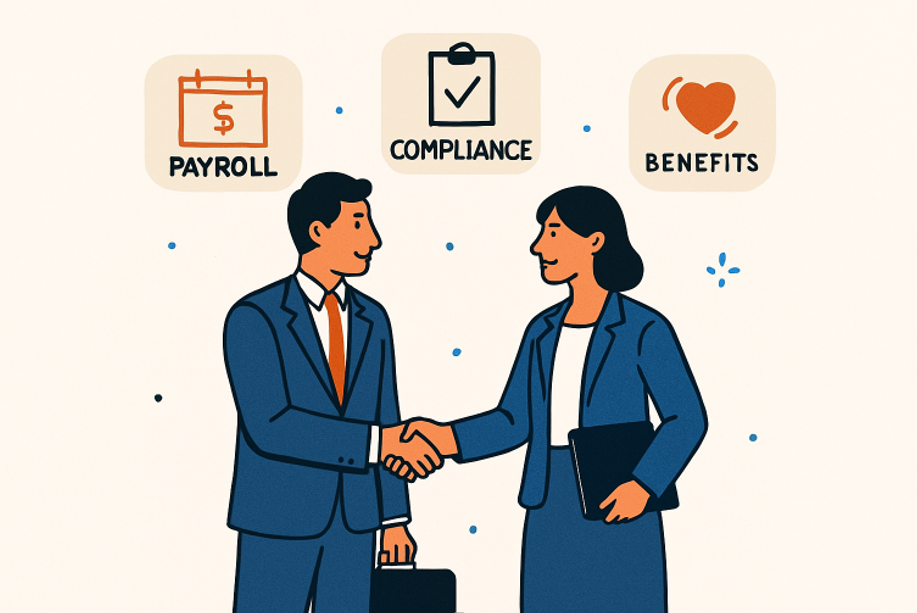Shaping the Future of Work: The Role of Professional Employer Organizations

- What Are PEOs?
- Benefits of Partnering With a PEO
- How PEOs Contribute to HR Management
- Compliance and Risk Management
- The Influence of PEOs on Employee Benefits
- PEOs and Small Business Growth Strategies
- Choosing the Right PEO for Your Business
- Future Trends in PEO Services
- Conclusion
What Are PEOs?
The need for streamlined human resources management has given rise to the popularity of Professional Employer Organizations, or PEOs. These organizations act as strategic partners, enabling businesses to outsource essential HR tasks, including payroll processing, employee benefits, risk management, and compliance. By establishing a co-employment relationship, PEOs enable businesses to manage a wide range of HR functions, resulting in simplified operations and enhanced regulatory compliance.
A reliable PEO provider can be a catalyst for growth and improved efficiency, especially for small and midsized businesses. By combining their expertise and resources, PEOs enable organizations to focus on core business initiatives while safeguarding their workforce against compliance risks.
Benefits of Partnering With a PEO
Partnering with a Professional Employer Organization (PEO) delivers tangible administrative relief and long-term financial advantages. By taking on shared responsibility for HR, payroll, benefits, and compliance, a PEO eases administrative burdens while enabling businesses to optimize their people strategies, thereby boosting both productivity and morale. According to Business News Daily, PEOs operate under a co-employment model: while you retain complete control over hiring, firing, and day-to-day management, your employees appear on the PEO’s books for legal and tax purposes—streamlining back-office operations and facilitating better growth outcomes.
Access to a broad range of HR expertise allows small and mid-sized businesses to make data-driven decisions, manage labor costs effectively, and cultivate a positive organizational culture. PEO clients often experience faster growth, higher profitability, and significantly reduced turnover, while being 50% less likely to experience financial distress or bankruptcy.
How PEOs Contribute to HR Management
Handling HR can be complex and time-intensive, spanning payroll, compliance, recruitment, onboarding, training, and performance management. PEOs offer business owners access to dedicated HR professionals who are skilled in current employment law, compensation trends, and best workplace practices. Their support reduces the learning curve for organizations that lack robust internal HR departments and minimizes exposure to common HR-related pitfalls. By assisting with everything from drafting employment policies to managing sensitive employee relations issues, PEOs become an invaluable extension of a business’s operational capacity.
Compliance and Risk Management
Staying compliant with employment laws, tax codes, and safety regulations is a persistent challenge, particularly as these rules are constantly evolving. PEOs serve as dedicated partners in risk mitigation—they monitor legislative changes at the federal, state, and local levels to help businesses avoid costly compliance errors. As highlighted by HR Morning, new employment law trends continue to reshape workplace requirements, making professional guidance more valuable than ever. PEOs typically guide everything from labor law posters to employee classification and workplace safety, greatly reducing a business’s legal exposure. In addition to compliance support, PEOs often handle the administration of workers’ compensation and unemployment claims, ensuring best practices and fair resolution while protecting employers from unnecessary claims-related expenses.
The Influence of PEOs on Employee Benefits
An attractive benefits package is pivotal to recruiting and retaining top talent. Through the PEO model of “employee pooling,” small businesses gain access to high-quality benefits usually reserved for larger corporations, such as comprehensive health insurance, dental and vision plans, 401(k) retirement offerings, and even lifestyle perks like wellness programs or flexible schedules. Enhanced benefits can drive employee engagement, loyalty, and job satisfaction, making small organizations as competitive as larger enterprises in the talent marketplace. These benefits, once out of reach for many, elevate a company’s image as a desirable place to work, thereby increasing its ability to attract highly skilled personnel.
PEOs and Small Business Growth Strategies
For entrepreneurs, time is an especially scarce resource. By offloading HR-related duties to a PEO, business leaders can channel their efforts towards innovation, core product development, or market expansion. According to recent studies, businesses using PEOs not only report greater workplace satisfaction but are also more likely to remain operational after five years compared to businesses that do not leverage PEO services. Freed from compliance stress and administrative bottlenecks, small firms can devote more energy to differentiating their brand, driving sales, and creating customer-centric solutions—a meaningful advantage in today’s dynamic markets.
Choosing the Right PEO for Your Business
Selecting a PEO is a significant decision that should be based on a thorough evaluation of your business’s unique needs and aspirations. Consider factors such as the breadth of HR services, industry specialization, technological capabilities, and client testimonials. Be sure to request a demo of any HR software, assess the responsiveness of support, and prioritize PEOs with proven regulatory expertise and references in your sector. Pinpointing a partner that aligns with your company’s size, industry, and culture ensures a seamless integration and maximizes the benefits of a PEO partnership.
Future Trends in PEO Services
The future of PEO services is shaped by emerging technology and evolving workforce needs. Artificial intelligence and HR analytics are transforming how PEOs deliver services, enabling data-driven decision-making and personalized employee experiences. Additionally, the increasing prevalence of remote and hybrid work models is prompting PEOs to tailor solutions for distributed teams and offer more flexible benefit options, such as wellness stipends or mental health support.
As talent markets become increasingly global and competitive, businesses relying on innovative PEO partners will be best positioned to anticipate and adapt to change quickly, ensuring ongoing organizational resilience and engagement.
Conclusion
In today’s competitive business environment, PEOs have emerged as trusted partners that simplify HR management while driving long-term growth. By assuming critical responsibilities such as payroll, compliance, benefits administration, and risk management, they provide small and mid-sized businesses with access to resources and expertise that would otherwise be out of reach. Beyond operational support, PEOs also play a vital role in shaping workplace culture, improving employee retention, and enabling leaders to focus on innovation and strategy. As technology continues to reshape the workforce and new employment challenges arise, businesses that align with the right PEO partner will be better equipped to stay compliant, attract talent, and remain agile in the face of change. Ultimately, PEOs are not just service providers; they are strategic allies in building sustainable, resilient, and competitive organizations.






